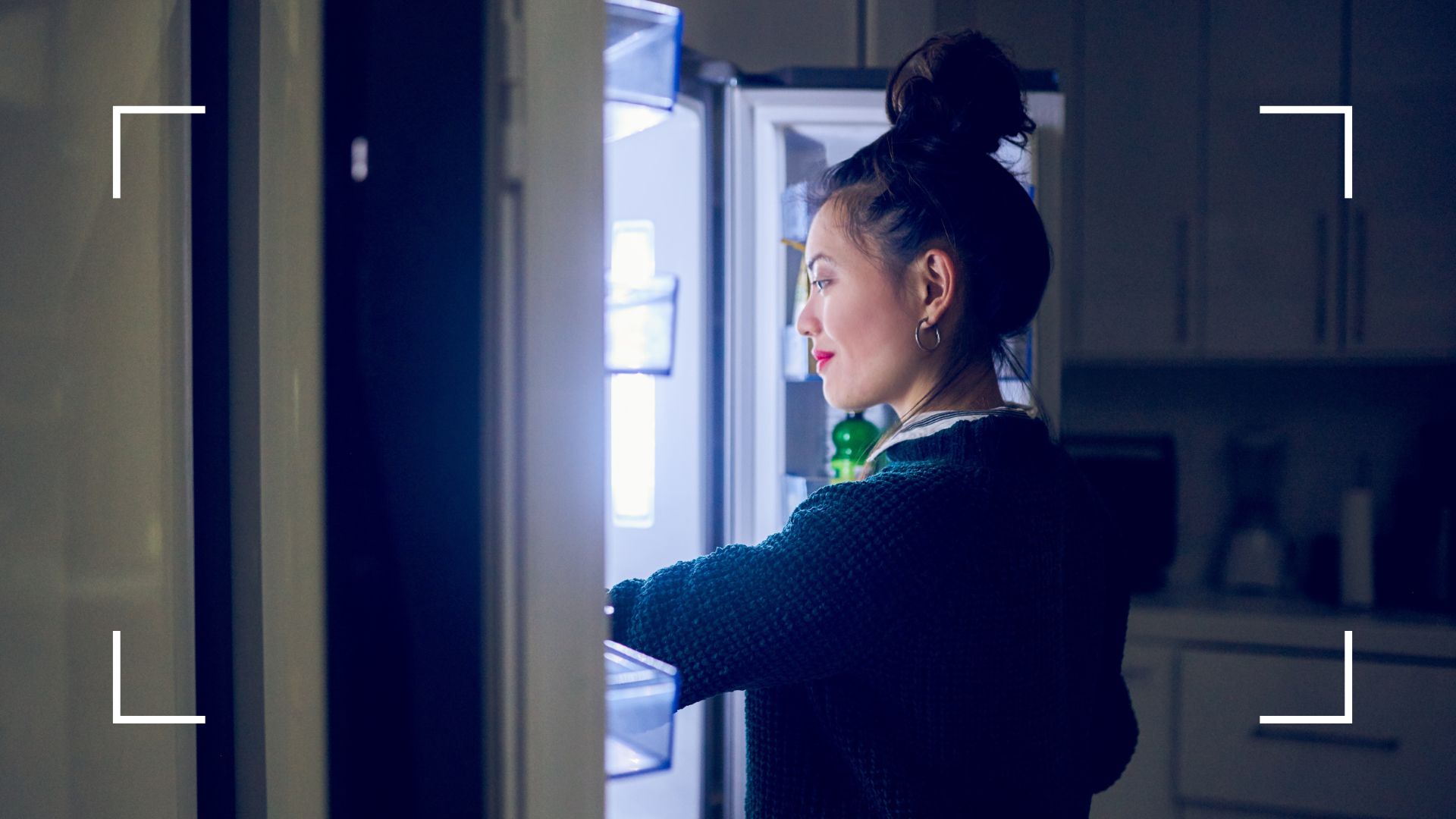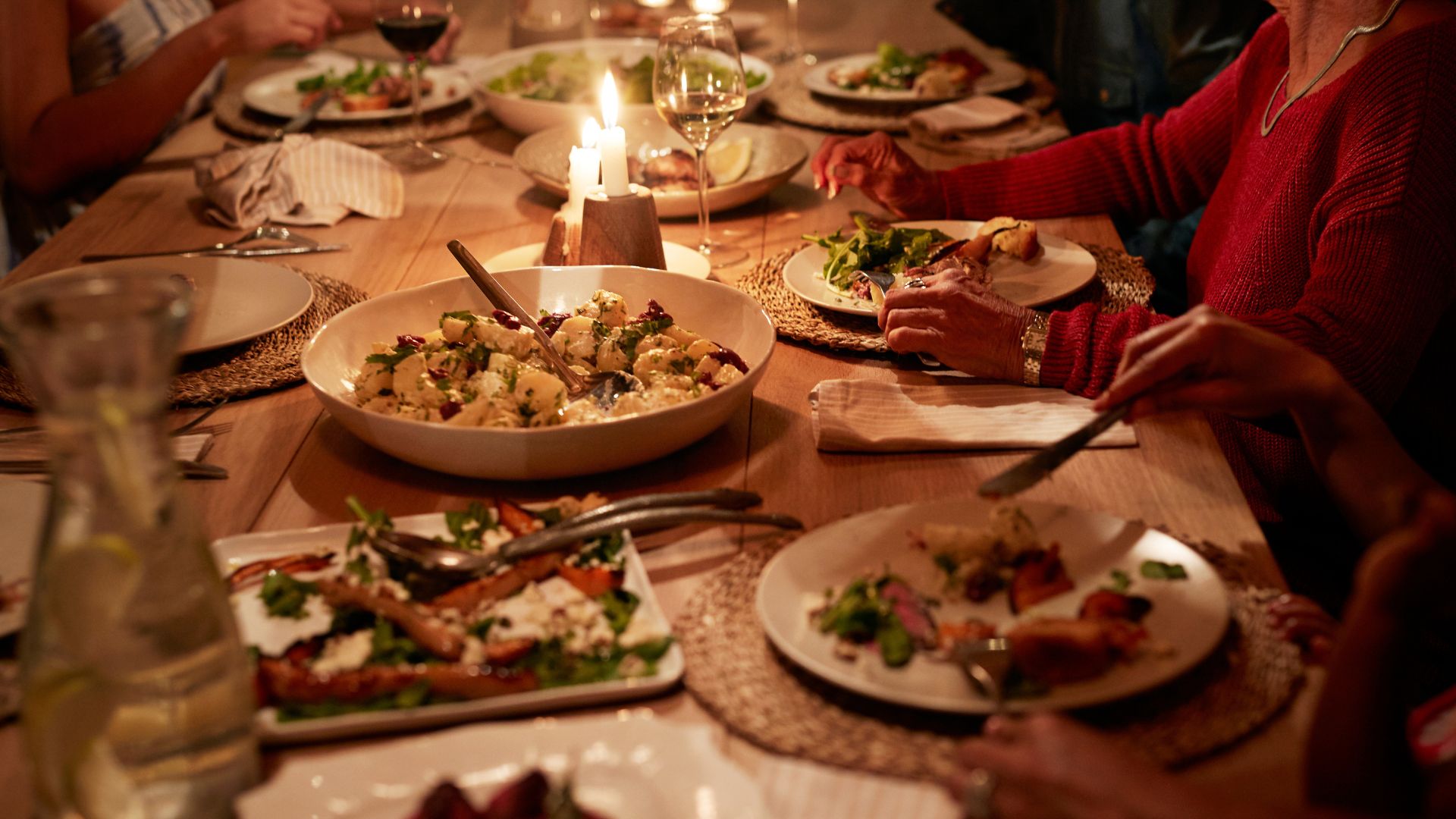A new study reveals the true impact of eating late at night on the body - but here's what nutritionists have to say
Whether you are eating late at night could be more important than you might think, if you're concerned about gaining weight


Whether eating late at night has any role to play in how we lose and gain weight has been under debate for years, with many nutritionists, dieticians, and scientists concluding that the timing of your last meal can have an impact. Others have pointed out that it's all about what you eat, rather than when you eat it.
And while the latter may be true, weight loss essentially comes down to calories in versus calories out for both weight loss and gain - at least at the beginning - new evidence suggests it's worth reconsidering the conclusion. A new review by Monash University in Australia collected all the recent research on the impact of late-night eating on obesity and weight gain in adults and found that the timing of meals does have some link to the risk of gaining weight over time.
Scientists conducting the research did note that further studies are required to establish exactly why, but it's thought that late-night eating can play a role for three key reasons: it impacts our metabolism, added glucose later in the evening can spike our appetite-regulating hormones, and this disruption can cause our gut bacteria to reduce its utilization of food for energy, leading to additional body fat.
But with the idea of a calorie deficit and balance always pushed to the front of our minds if we're dieting but not losing weight, what does this all really mean? Here, two nutritionists explain what really matters.
Does eating late at night make you gain weight?
No, eating late at night does not push your body to gain more weight than it would do if you ate your last meal of the day earlier in the evening. While mentally our attitude to food may change in the later hours, nutritionist Signe Svanfeldt explains that, for the most part, you'll only gain weight if you eat more calories than you burn. "It all comes down to how much energy our body burns and our daily intake. What we eat and the quantity is the main reason for any weight changes, not so much the time of day it's consumed," she explains, pointing out the importance of a calorie deficit to lose weight.
"However, when eating meals or snacks late at night, we sometimes tend to make less nutritious choices, such as those foods typically high in calories, saturated fats, sugar, and sodium. This can lead to exceeding our calorie requirement, eventually leading to weight gain," says Svanfeldt, who is also the resident nutritionist for the healthy eating app Lifesum, one of the best health apps as reviewed by us.
So, if you can only squeeze in your final meal later in the evening, you have no reason to be concerned about the timing of your meal alone for managing any weight concerns you might have. "For some, eating late at night might be the only option to get enough energy in their daily intake," the nutritionist adds.
Sign up to our free daily email for the latest royal and entertainment news, interesting opinion, expert advice on styling and beauty trends, and no-nonsense guides to the health and wellness questions you want answered.

When it comes to discussing weight loss, whether learning how to lose weight without dieting, the role of exercise, or anything else, it's most important to recognize that everyone is different. No two bodies are the same so why would weight loss be the same for everyone?
This means that some people may have more of an adverse reaction to eating late at night than others. And if you think consistent late-night eating could be something you're negatively impacted by, there is some evidence to help explain why.
"Of course, sometimes we later in a more social environment or work gets in the way and that's a normal part of life," says registered nutritionist Jenna Hope. "It's consistently eating late which can have negative impacts."
Why does eating late at night have an impact at all?
1. It can disrupt our circadian rhythm
"It’s commonly believed that what you eat is more important than when you eat. However, more recently, evidence has emerged to suggest that eating late at night and outside of regular daytime hours can impact our gut microbiome and glucose metabolism," says nutritionist Hope.
These regular daytime hours correspond to the body's circadian rhythm, which is a 24-hour internal clock that controls everything from our hunger levels and metabolism to how we absorb nutrients and our insulin sensitivity.
Eating outside of these eight to 12 daylight hours, studies by San Diego State University suggest, may mean your body processes calories a little differently and less effectively. This could, in turn, lead to weight gain over time.
2. Eating late at night impacts our gut bacteria
The change that eating late at night can have on our circadian rhythm goes further, however. As nutritionist Hope explains, "Evidence has shown that eating outside of regular daytime hours can disturb the relationship between our peripheral circadian clocks and our epithelial cells. Plainly speaking, this can disrupt the link between the circadian rhythm and the gut microbiome."
As noted, our circadian rhythm is a 24-hour pattern that regulates lots of different biological functions. There's more and more research, including that by the University of Illinois, to suggest that our gut microbiome is also regulated by these internal clocks as well as our eating behaviors.
We hear about how to improve your gut health so regularly nowadays but many people still underestimate the importance of the gut when it comes to maintaining a healthy weight. "If the health of our gut microbiome is compromised then we may not be able to absorb and utilize nutrients as well. This can increase the amount of energy we store and so could increase the risk of weight gain over a long period of time," Hope says.
3. It can change our appetite hormone levels
Eating late may disrupt our appetite hormones, says Hope, pointing to another new study published earlier this year. The research from Brigham and Women's Hospital found that overweight participants who ate earlier in the day reportedly had significantly different levels of cravings and feelings of fullness compared to those who ate later. The participants who ate four hours later than their counterparts were found to be twice as likely to be hungry during the day compared to the earlier eaters, with more of a desire for starchy and salty foods rather than dairy or vegetables.
This, the scientists found, was due to the decrease in levels of leptin - the hormone that signals to our brains that we're full - and an increase in ghrelin - the hormone that signals hunger - over the full 24-hour sleep cycle.
"Additionally, some evidence has shown that consuming higher sugar foods later at night may spike glucose levels more than when the same foods are eaten earlier on in the day," Hope says. When this level eventually dips back to normal, feelings of hunger and the desire to eat, whether or not we've eaten recently, tend to come back pretty quickly.
Does eating late at night affect sleep?
It can for some people, yes. "Our sleep patterns are highly individual and they can be impacted by dietary choices," says Svanfeldt. "Eating large meals later at night as well as very spicy, fatty, or fried foods, can cause stomach discomfort and interfere with your sleep pattern, as can foods and drink that contain caffeine."
Getting enough sleep is essential for everyone's wellbeing, but for those concerned about their weight, it plays an additional important role: it helps to regulate those all-important hunger hormones. Several studies have highlighted this over the years, with research from the University of California revealing that when people are sleep deprived, they tend to snack later in the evening and are more likely to choose snacks high in carbohydrates. Another study by the University of Chicago found that participants lacking in sleep chose foods with twice as much fat as those who slept for a full 8 hours.
However, "having a smaller nutritious snack during the evening won't have the same negative effect on most of us," Svanfeldt adds. So if you're concerned about food interfering with your sleep hygiene routine post-9 pm, rest assured a small bite won't make a difference.
How to stop eating late at night
- Make sure to eat plenty of protein and fiber: As the two most filling nutrients, according to Purdue University, these will be more likely to leave you feeling full later into the evening and so less likely to snack.
- Eat mindfully: "When eating late at night, we tend to eat while doing other things, such as watching TV. This can lead to mindless snacking or eating, which often makes us eat more food than we actually think we do or need," says Svanfeldt. "So, aim to eat all of your meals mindfully, focusing on the foods that you are eating with all of your sensations."
- Keep snacks out of the house: There's nothing wrong with having a sweet snack later in the evening but if you're looking to stop eating late at night, removing these will probably be a good idea. Out of sight, out of mind, as the saying goes.
- Make sure you get enough sleep: Not only will learning how to sleep better mean you feel more refreshed when you wake up, there's plenty of evidence to suggest that sleep deprivation has a huge impact on our cravings.
- Eat earlier in the evening: If it's late-night cravings we're talking about, choosing to eat earlier on in the evening will be a surefire way to prevent these. "It’s important to note that for some individuals such as shift workers, eating late is unavoidable and therefore it may be better to eat a well-balanced nutritious meal as early as possible and avoid snacking throughout the night," says Hope.

Grace Walsh is woman&home's Health Channel Editor, working across the areas of fitness, nutrition, sleep, mental health, relationships, and sex. She is also a qualified fitness instructor. In 2025, she will be taking on her third marathon in Brighton, completing her first ultra marathon, and qualifying as a certified personal trainer and nutrition coach.
A digital journalist with over seven years experience as a writer and editor for UK publications, Grace has covered (almost) everything in the world of health and wellbeing with bylines in Cosmopolitan, Red, The i Paper, GoodtoKnow, and more.